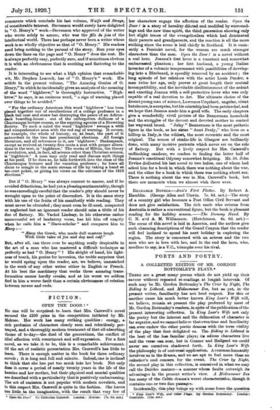FICTION.
OPEN THE DOOR ! *
No one will be surprised. to • learn that Mks. Carswell's novel secured the £250 • prize in the - competition initiated by Mr. Melrose. Her work has many striking qualities : energy, a, rich profusion of characters clearly seen- and relentlessly. por- trayed, and a thoroughly modem treatment of that all-absorbing theme of to-day—the duel- of the generations, the conflict of filial affection with resentment and self-expression. For a first novel, as we take it to be, this is a remarkable achievement. Of the art of realistic presentation Mrs. Carswell's has little to learn. There is enough matter in, the book for three ordinary novels ; it is long and full and minute.. Indeed, one is inclined to think that she has put too much into her book. Not only does it cover a period of nearly twenty years in the life of the heroine and her mother, but their physical: and mental qualities are described with a particularity that is positively embarrassing. The art of. omission is not popular with modern novelists, and In this respect Mrs. Carswell is quite in. the fashion. She leaves to little to the imagination, with the result that very few of Open the Doer! By Catherine Carswell. London : Melrose. [7s. 65. net.] her oharaoters engage the affection of the reader. Open the Door / is a story of heredity diluted and modified by surround- ings and the new time spirit, the third generation showing only but slight traces of the evangelicalism which had dominated their parents and grandparents, and the reaction is all the more striking since the scene is laid chiefly in Scotland. It is emin- ently a Feminist novel, for the women are much stronger oharacters than the men. Open the Door / is a novel without a real hero. Joanna's first lover is a transient and somewhat embarrassed phantom ; her first husband, a young Italian inventor of a volcanic temperament with possibilities of develop- ing into a Bluebeard, is speedily removed by an accident ; the long episode of her relations with the artist Louis Pander, a man twice her age, only proves at great length their mutual incompatibility, and the inevitable disillusionment of the ardent and exacting Joanna with a self-protective lover who was only capable of a real devotion to Art. Her ultimate choice of the decent young man of science, Lawrence Urquhart, angular, silent but sincere, is a surprise, but his courtship had been patriarchal, and we hope that Joanna made him a good wife. The early chapters give a wonderfully vivid picture of the Bannerman household and the struggles of the devout and devoted mother to control her wayward brood. " Juley " Bannerman is the most pathetic figure in the book, as her sister " Aunt Perdy," who lives on a hilltop in Italy, is the wildest, the most eccentric and the most original. The scenes of studio-life in Glasgow are brilliantly done, with many incisive portraits which never err on the side of flattery. But with a lively respect for. Mrs. Carswell's unflinching candour, we confess to finding the latter half of Joanna's emotional Odyssey somewhat fatiguing. Mr. St. John Ervine dedicated his last novel to two ladies, one of whom had asked him for a book in which there was nothing about the war, and the other for a book in which there was nothing about sex. There is nothing about the war in Mrs. Carswell's book, but there are- moments when we almost wish there were.


































 Previous page
Previous page